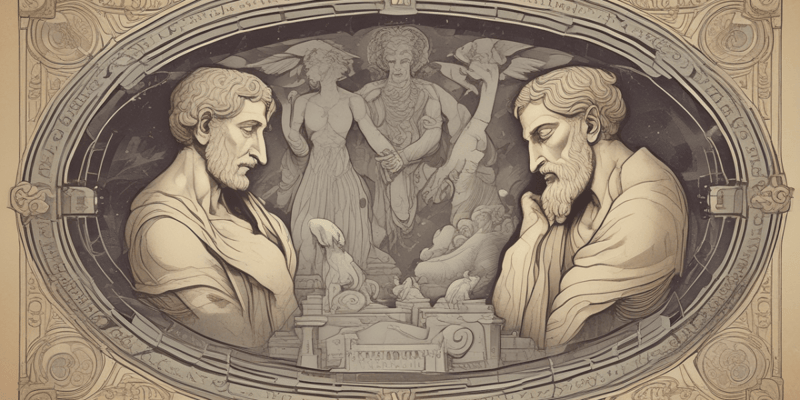Podcast
Questions and Answers
Who is known for connecting perception with brain mechanisms and principles of human knowledge?
Who is known for connecting perception with brain mechanisms and principles of human knowledge?
Which individual emphasized creative synthesis and criticized his father's strict upbringing methods?
Which individual emphasized creative synthesis and criticized his father's strict upbringing methods?
Who laid the foundation for behaviorism by focusing on repetition and associations?
Who laid the foundation for behaviorism by focusing on repetition and associations?
Which researcher's mistake in observing star movement influenced the development of psychology?
Which researcher's mistake in observing star movement influenced the development of psychology?
Signup and view all the answers
Who advocated for the experimental method in the 1830s to study physiological influences on psychology?
Who advocated for the experimental method in the 1830s to study physiological influences on psychology?
Signup and view all the answers
Which researcher's autopsy led to the discovery of Broca's area, a crucial speech center in the brain?
Which researcher's autopsy led to the discovery of Broca's area, a crucial speech center in the brain?
Signup and view all the answers
Who is considered to view early philosophical conjectures as the prehistory of modern psychology?
Who is considered to view early philosophical conjectures as the prehistory of modern psychology?
Signup and view all the answers
Which period saw the origins of psychology related to Greek philosophers like Plato and Aristotle?
Which period saw the origins of psychology related to Greek philosophers like Plato and Aristotle?
Signup and view all the answers
What did Descartes suggest in resolving the mind-body problem?
What did Descartes suggest in resolving the mind-body problem?
Signup and view all the answers
What did materialism focus on in explaining mental processes?
What did materialism focus on in explaining mental processes?
Signup and view all the answers
How did psychology distinguish itself from philosophy in the 19th century?
How did psychology distinguish itself from philosophy in the 19th century?
Signup and view all the answers
Which philosopher introduced positivism in psychology, emphasizing objective observation of natural phenomena?
Which philosopher introduced positivism in psychology, emphasizing objective observation of natural phenomena?
Signup and view all the answers
Study Notes
- The course on Great Experiments in Psychology covers the history and genesis of psychology as a science, emphasizing the importance of studying history to understand the development of psychology.
- Psychology's origins can be traced back to two different periods: one during the time of Greek philosophers like Plato and Aristotle in the 5th century BC, and another during the 18th and 19th centuries with modern philosophers.
- Early philosophical writings from Greek philosophers formed the roots of formal psychology, addressing areas like memory, learning, motivation, perception, and abnormal behavior.
- Psychology distinguished itself from philosophy in the 19th century by relying more on controlled observation and experimentation to study human nature.
- Kurt Danziger considers early philosophical conjectures as the prehistory of modern psychology, emphasizing the disciplinary subject matter's emergence.
- Descartes resolved the mind-body problem by suggesting a mutual interaction between the mind and body, contrary to the previous unidirectional view.
- Auguste Comte introduced positivism, emphasizing objective observation of natural phenomena and influencing the development of science and philosophy.
- Materialism focused on explaining mental processes in physical terms, leading to a shift towards studying the anatomical and physiological structures of the brain in the 18th and 19th centuries.
- Empiricism played a significant role in experimental psychology by focusing on knowledge acquisition through sensory experiences, contributing to the formal development of psychology as a science.
- British empiricists like John Locke were instrumental in exploring the human mind and brain, with Locke's essay "An Essay Concerning Human Understanding" delving into how the mind acquires knowledge through sensation and reflection.- George Berkeley wrote An Essay Towards a New Theory of Vision, connecting perception with brain mechanisms and principles of human knowledge.
- Hartley's Observations on Man laid the foundation for behaviorism by focusing on repetition and associations.
- James Mill viewed the human mind as a machine in his work Analysis Of The Phenomenon Of The Human Mind.
- John Stuart Mill, James Mill's son, emphasized creative synthesis and criticized his father's strict upbringing methods.
- David Kinnebrook's job at the Royal Observatory in 1795 influenced the development of psychology due to a mistake in observing a star movement.
- Wilhelm Bessel studied individual differences in astronomical calculations, leading to the understanding of personal differences in brain processes.
- Physiological influences on psychology began with Johannes Muller advocating for the experimental method in the 1830s.
- Early brain mapping experiments involved removing parts of the brain in animals to understand brain functions, such as reflex behavior and coordination.
- Broca's autopsy on a man unable to speak led to the discovery of Broca's area, a crucial speech center in the brain.
- Franz Josef Gall's research on mental characteristics affecting skull shape and Santiago Ramon's experiments on nerve impulses through electrical stimulation advanced brain science in the 1800s.
- The Mechanistic Spirit movement in the 1840s focused on connecting physiology with physics, leading to experimental psychology and the study of human behavior.
Studying That Suits You
Use AI to generate personalized quizzes and flashcards to suit your learning preferences.
Description
Test your knowledge on the history and genesis of psychology as a science, exploring its origins from Greek philosophy to modern experimentation. Questions cover key figures like Descartes, Comte, Locke, Mill, Gall, and advancements in physiological influences on psychology.




